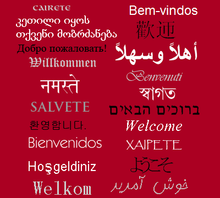Willkommenskultur
The concept of welcoming culture (in German: Willkommenskultur) designates firstly a positive attitude of politicians, businesses, educational institutions, sports clubs and other institutions towards foreigners, especially towards migrants. Second, the term expresses the wish that all migrant people encountered by these institutions may be accepted and particularly not be exposed to discrimination. Third, the word welcoming culture means all the measures promoted by a positive attitude towards migrants in others.[1][2][3][4][5]
The German equivalent Willkommenskultur was elected in Austria in December 2015 as "Word of the Year".[6]
Foreign perspectives
The English daily The Guardian distinguishes two meanings of the term welcoming culture:
Originally the term was an alarm signal that should attract people from abroad to Germany. to compensate for the huge shortage of skilled workers, particularly in sparsely populated areas of Germany. Since the beginning of the European refugee crisis in 2015, the term was being used to promote assistance for hundreds of thousands of refugees coming to Germany,[7] who were received by highly visible posters "refugees welcome", and by actual help of any kind, mainly on private initiative.

The French daily Libération adds that the word "welcome culture" was originally created decades ago in the tourism industry.[8] According to this view "welcome culture" would also be an Eindeutschung of the technical terms Hospitality Management.
The New York Times suggested that Chancellor Angela Merkel was also laying the foundation for "new German" groups, namely the Syrian-German, German-Iraq and Afghanistan-Germans.[9]
References
- ↑ "Muslims: The Willkommenskultur is a chance for reconciliation | ZEIT ONLINE". Zeit.de. 2015-11-24. Retrieved 2016-01-27.
- ↑ "′Willkommenskultur′ in Germany, ′non merci′ in France | Germany | DW.COM | 17.09.2015". DW.COM. Retrieved 2016-01-27.
- ↑ Hill, Jenny. "Germany struggles to adapt to immigrant influx". BBC News. Retrieved 2016-01-27.
- ↑ "Glossarartikel: Willkommenskultur | IQ Netzwerk Niedersachsen". Migrationsportal.de (in German). Retrieved 2016-03-29.
- ↑ "Gewinnung und Bindung von Neubürgern in der Region Schwarzwald-Baar-Heuberg". Wirtschaftsfoerderung-sbh.de. Retrieved 2016-03-29.
- ↑ "'Willkommenskultur' is Austrian word of the year - The Local". Thelocal.at. Retrieved 2016-01-27.
- ↑ Doris Akrap. "Germany's response to the refugee crisis is admirable. But I fear it cannot last | Doris Akrap | Opinion". The Guardian. Retrieved 2016-01-27.
- ↑ "Willkommenskultur - Libération". Liberation.fr. 2015-12-30. Retrieved 2016-01-27.
- ↑ "As Germany Takes in Refugees It Also Rehabilitates Its Image". The New York Times. Retrieved 2016-01-27.